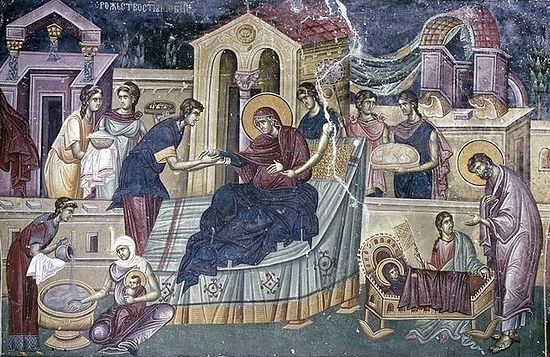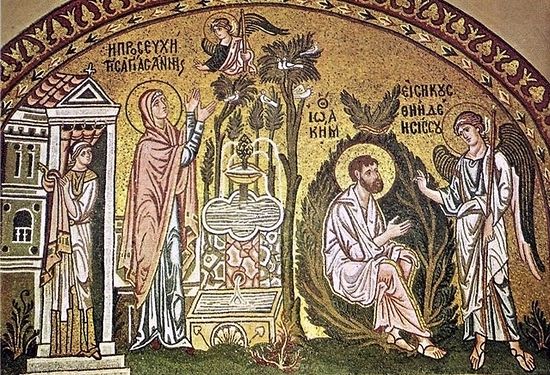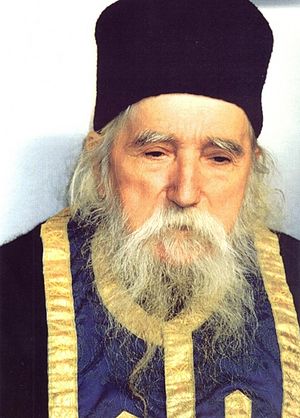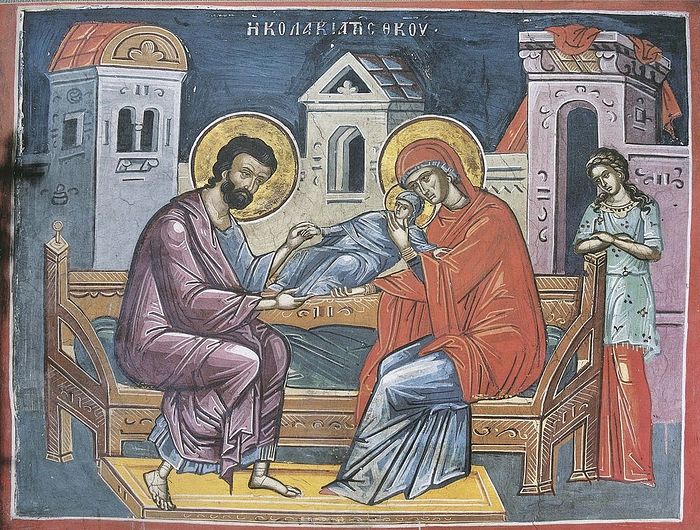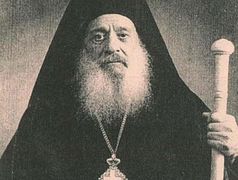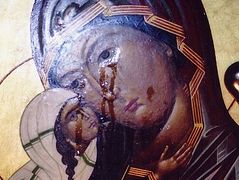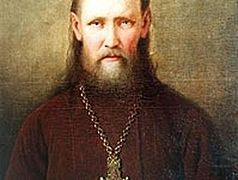Thy Nativity, O Virgin,
Hath proclaimed joy to the whole universe!
The Sun of Righteousness, Christ our God,
Hath shone from Thee, O Theotokos!
By annulling the curse,
He hath bestowed a blessing.
By destroying death, He hath granted us eternal
Life.
Troparion of the Feast
Beloved faithful!
When I think of the great honor and glory with which the Most-Good and Most-Generous God has adorned in the heavens the Mother of God, when I think about the eternal doxology with which the heavenly powers praise Her, then, when I think about those services and prayers which all the children of the Church of Christ lift up to Her here on the earth, and of the laudatory words composed in Her honor by those holy and elect of God, the thought enjoins me, foolishly, to add today, to the bright feast of the Nativity of the Most Holy Theotokos, this tiny droplet to the great sea of praises in Her honor. This is what I would like to say.
My beloved brothers in Christ, have you ever pondered why the holy and divine fathers who composed the Synaxarion and established the feasts of the Lord, adorning the course of the year of the Lord, began with the Nativity of the Theotokos and ended with Her Dormition? After all we, as you know, in the first month of the new Church year, on September 21, celebrate the Nativity of Most Holy Theotokos, and in the last month of the Church year, on August 28, we celebrate her Dormition.[1]
The mystical reason why the year begins and ends with feasts of the Theotokos is that the All-Merciful God was pleased to begin and finalize His plan for the salvation of mankind from servitude to the devil and the torments of hell by the intercession of the Mother of God.
Understand, dear brothers, that God opened His Divine plan for the salvation of the world through the Theotokos already at the beginning of the world, when He told Eve that her seed would crush the serpent’s head (Gen. 3:15). For about Christ it was said “Seed of the Woman” as having been born not from the seed of a man. At the very beginning of the world the All-Good God already through the old Eve in this mysterious way pointed to the new, spiritual Eve, that is to the Mother of God, able to bear in the fullness of time the New Adam, Christ, Who by His Incarnation crushed the head of the serpent, and death, and sin, for as in Adam all die, so in Christ all are quickened (cf. 1 Cor. 15:22).
And understand, brothers, that in the plan of salvation for mankind, the Mother of God was already prefigured in Noah’s dove. For as it bore to Noah the good news of the cessation of the flood, so the Mother of God—the chosen dove of God and the Holy Spirit—through bearing Christ brought to the world the great news of its redemption from slavery to sin. The Mother of God was prefigured also by Jacob’s ladder upon which ascended and descended the angels of God (Gen. 28:12), for the Mother of God was that ladder upon which God came down to us and upon which our nature ascended to the right hand of God (Canon of the Akathist to the Theotokos).
And again the Mother of God was foreshadowed by the Burning Bush, burning but yet not consumed by the flames of the Divine fire (Ex. 3:2), for She was the spiritual bush, receiving into Herself the fire of the Godhead and not being burnt by It. The Mother of God was also foreseen in Aaron’s budding rod (Number 17:8), for she went up from her barren parents who dwelt in purity, conceived by the Holy Spirit and bore Christ (Lk. 1:35).
The Mother of God was prefigured by the seven-branched candlestick (Ex. 37:17-24), for She enlightened the world with the seven gifts of the Holy Spirit. And again she was prefigured by the golden censer (Ex. 37:16, 40:26-27), for she brought to the world the fire of the Godhead.
Further, the Mother of God was prefigured by the tabernacle of the Ark of the testimony and the tablets of the old law (Ex. 40:20-22) because She is the sacred tabernacle and the animate ark, and the tablet of the law of grace.[2] The Mother of God was foreshadowed by the shut gate seen by the prophet Ezekiel, for through Her passed but God alone and She remained shut, not violating the fountain of Her virginity (Ezek. 44:2). The Mother of God is the Most Holy Queen, splendidly arrayed, Who Her blessed forefather, the prophet and king David saw in the Holy Spirit standing at the right hand of the throne of God, for He Who rules by the thunder of heaven in Her settled and live (Ps. 44:10). The Mother of God was foreshadowed again in the light cloud upon which God descended to us.
The Mother of God is the holy mountain upon which God was pleased to settle (Is. 2:2). The Mother of God is the porphyric and radiant cloud in which was hidden the noetic Sun, Christ our God. The Mother of God was prefigured also in the Ark of the old law, before which the king and prophet David danced with joy (2 Kg. 6:2-5).
Beloved faithful!
From the very many witnesses and symbols prefiguring the Mother of God I have brought you here but a few, that you would understand that the mystery and foundation of our present feast has very ancient origins and was proclaimed by the patriarchs and prophets of God. Now I will show you, although briefly, how the Divine event of the birth of the Mother of God was accomplished in the law of grace.
In Palestine, in the city of Nazareth, there lived a man named Joachim, and his wife Anna. These spouses were righteous and full of every virtue, coming from the revered royal line. However, they bore great grief in their life, as they had no children. At that time the childless were considered by men to be hated of God and accursed, as per the testimony of Sacred Scripture which says, “Cursed is he without seed in Zion and posterity in Jerusalem.” No one could take food from such people, and in the temple they were treated with contempt and their sacrifices brought before God were not accepted.
One day, on a great feast of the Jews, Joachim and his spouse Anna went to the temple, and from their great fervor also wanted to bring to God a sacrifice from their property. The priest did not want to accept it and severely upbraided them, saying: “Why do you venture to offer to God a sacrifice, being childless and barren?” Then Joachim and Anna, being covered with shame and grief, left the temple. When they returned home in great sorrow, Joachim said to his wife Anna: “My heart tells me not to enter our home for we are persecuted by God. I will climb the mountain and there fast and pray to God, that He might take pity on us and grant us children.”
Thus, they parted, and Anna went home to Nazareth, and, having distributed many alms, went to the garden and began to pray to God with pain and many tears, saying: “Lord Almighty, with but a word Thou didst create heaven and earth and all things visible, didst enjoin Thy creations to live and multiply, didst bless Sarah, the wife of Abraham, and she bore Isaac in her old age, bestowed upon Hannah a son and she bore the prophet Samuel! Grant me the fruit of my womb and leave me not as reproach among men, for should I bear a son or daughter, from my whole soul I will dedicate this child to Thee and give him to service in the temple of Thy glory.”
Speaking thusly, Anna tearfully prayed to God, as did Joachim, her husband, praying much to the Lord on the mountain, weeping with pain of heart, and God heard their prayer and lamentation. Then He sent to Joachim on the mountain the archangel Gabriel who said to him: “Rejoice, Joachim, and make merry, for I have come to declare unto thee that unto thee shall be a Daughter, Who is to bear in virginity the King of all, God! Put aside the sorrow and grief of thy heart and go unto thy house, for God hath heard thy prayer. Only firmly trust on my word and give thanks unto God.”
Having said this, the angel of God hastened to Anna and said to her these words: “Anna, Anna, thy prayer is heard, and thou shalt bear a Daughter, and shall call Her by the name of Mary, and all peoples of earthy shall rejoice in Her.”
Thus, Joachim, hearing the word of the archangel Gabriel, went home in gladness and found Anna there, greatly rejoicing at the news received from the angel. Then Anna, having become pregnant, in ten months gave birth to a Daughter, Who, according to the custom of the old law, on the eighth day was brought to the temple priest to give Her a name, and the youth was given by mysterious means the name of Mary, as “Mary” means “Queen,” for She was to become the Queen of the angels and the Mistress of all men.
Yet one more mystery is hidden in the name Mary. It consists of five letters,[3] mystically representing the name of five great and renowned Old Testament women. So, the letter “M” points to Mariam, the sister of Moses and Aaron; the letter “a” points to Abigail, the wife of Nabal; the letter “r” points to Rachel, the wife of Jacob; the letter “i” points to Judith,[4] the holy widow; and the letter “a” to [H]Anna[h], the wife of Elkanah.
By this is implied that all those gifts and virtues with which were crowned all these women were combined in the child of God Mary, incomparably surpassing them. For Mariam, the sister of Moses, shone with two gifts—virginity and prophecy, and in the Blessed Mary virginity and prophecy abide forever. Abigail humbly entered into marriage, and the Virgin Mary above all for Her humility is praised, for God hath regarded the low estate of His Handmaiden (Lk. 1:48). Rachel was known for her beauty, and the Virgin Mary is the very beauty and splendor of heaven. Judith is known for killing Holofernes in her wisdom (Judith 13:8), but the Virgin Mary was made the habitation of the Wisdom and Word of God and by His power slew the incorporeal Holofernes—the devil. Hannah, being barren, is glorified for she became the mother of the great Samuel (1 Kg. 1:20), while the Most Holy Virgin Mary is much more glorious, for she not barrenly, but being a Virgin, became the Mother of the Great Emmanuel (cf. Is. 7:14).
But, my brethren, how is possible to compare between the gifts of the saints and righteous ones and She Who is the treasury of all of the gifts of the Holy Spirit? For, according to the testimony of St. Jerome, every saint received from God at least some share of the gifts, but the Most Holy Virgin Mary revealed Herself to be full of every endowment.
Beloved faithful!
This present day has come to us with spiritual light, with holy joy, for today is born the Mother of light and joy. Today is proclaimed to mankind grace and deliverance, for the Mother of grace and mercy is born. We celebrate today not the birth of a saint, but the birth of Her Who is holier than all the saints. It is not a gathering of angels that is honored today, but the Nativity of the Queen of the angels—not the birth of the mother of an earthly king, but the very Mother of the Lord and God of glory.
Today the Queen of all and Mistress of the world has from a barren and withered womb shone forth. And who will be able to worthily sing Her Nativity? The Church of Christ itself shows that it is impossible, saying: “Verily, all tongues are at a loss to praise thee properly; and every mind, even though transcending the world, is distracted in thy praise, O Theotokos.”[5]
So, my brothers, if the king and prophet David leapt rejoicing and was exultant before the Old Testament Ark, mystically foreshadowing the Mother of God (2 Kg. 6:5), then how much joy and gladness ought we to have today, when not mysteriously and in images but in very fact we celebrate the Nativity of the Most Holy Theotokos—the living and animate ark, in Whom God resided? If the obscure and mysterious brought so much merriment to the thrice-blessed ancestor of the Mother of God, then how much joy is he experiencing now in heaven and how much joy and comfort ought we have today, us earthly beings, when into the world appears the Child of God, the Virgin Mary, through Whom shone forth the Sun of the salvation of mankind?
Truly today the All-Good and Most-Generous God has visited in His mercy His creation and called to rejoicing with a great joy not only the king and prophet David, but also the ancestors of God Joachim and Anna, with so many tears and lamentations having prayed to God to grant them fruit of the womb. All of human creation rejoiced, for the entire human race awaited the coming into the world of the Holy Virgin Who in time would bear Emmanuel, which is translated as “God with us” (Is. 7:14).
Today we celebrate the Nativity of the Queen of heaven and earth—the fruit of prayer, mercy and good deeds, received from God by the holy parents Joachim and Anna. How ought we today to celebrate; with what honor and reverence; with what holiness and purity?
Today may the barren and childless be comforted by the hope that through their alms and good deeds, fasting and prayers they too will be found worthy of children from God.
Today may the young remain in abstinence and may they celebrate in purity and honor the Nativity of the Mother of God.
Today may virgins and children exult in joy, for into the world for us has come the Mother of virginity.
Today may the old and the sick rejoice, for the staff of old age and comfort of the ailing has appeared to the world.
Today may those fallen into grievous sins and despairing of their salvation be comforted by hope, for the restoration of the fallen and the hope of the hopeless has been born on earth.
Each of you present, think about how many podvigs and acts of mercy were performed and how many tears the ancestors of God Joachim and Anna shed that God might grant them a Child. Then, for such zeal and such prayers from the depths of their souls they received a Daughter—the All-Pure Virgin Mary, of Whose birth the heavens and earth rejoiced.
And now I give you a question: how much torment and wrath, what punishments will they receive from God, those parents who not only did not pray to God to give them a child, but who kill their children by means of abortion or some other method of preventing the birth of their children? If the Divine canons punish by twenty years of excommunication from the Church and prohibition from Holy Communion for the willful killing of just one person, then how to punish those Christians who willfully kill not one, but two, three and even more children?
Perhaps, you will say, that the aborted child had not reached nine months, which means it was supposedly not a serious sin. Do not think such things, for you think a great wrong. The Divine Fathers say that as when lightning flashes forth and thunder bursts then here is seen the light, so it is in the coupling of spouses: in that moment, when they have come together, by the power of God is conceived in the womb of the mother both body and soul and the child begins its existence. And who after this coupling, even if only within an hour, tries to prevent this birth in some way, the same receives great condemnation as a murderer.
Thus they truly sin, those who prevent the conception of a child. Let such recall Onan, the son of the patriarch Judah, who for but this one sin was slain by God (Gen. 38:10).
Keep watch, brothers, for he who commits abortion or prevents the birth of a child by some other means is not once, but twice a killer. Those who kill a baptized man can kill only his body, but if the person stood in right faith and virtues, then his soul remains eternally alive because it crossed over from death to life. But those who kill a child before Divine Baptism are twice killers, because they rob both the child’s body and soul of blessed eternity, as per the testimony of the Savior, Who said: He that believeth and is baptized shall be saved; but he that believeth not shall be damned (Mk. 16:16).
Beloved faithful!
Today, however, we ought to be glad, for on earth is born the Mother of Life, the Virgin Mary, the holiest human being, Who God chose from before the foundation of the world to bear Jesus Christ by the Holy Spirit in Bethlehem of Judea. May babes and virgins rejoice today, children and youths, mothers and widows, priests and monks, for to us is born our spiritual Mother and foremost Supplicator, Comforter, and Intercessor before the All-Holy Trinity.
Let us go to Nazareth in Galilee to bring the angelic praises to the Infant and Virgin Mary, the Most Pure Theotokos, born of the holy ancestors of God Joachim and Anna in their old age.
However, in order to praise the Child and Virgin Mary, we must have good-natured hearts, as have infants, and a pure life untainted by carnal sins. To praise Her Who was to become the Mother of the Son of God we must have the heart of a mother, the tenderness and patience of a mother, and the love and compassion of a mother for all. Otherwise our prayers and our gifts, if they come from a heart full of sins, hatred and evil, will not be received by the Most Holy Virgin Mary.
With these joyous thoughts full of hope and with hearts full of mercy and humility let us enter into the holy churches and, having kissed the icon of the Mother of God, let us raise up to Her with faith this short prayer: “The door of compassion open unto us, O blessed Theotokos, for hoping in thee, let us not perish; through thee may we be delivered from adversities; for thou art the salvation of the Christian race.”
Amen.

